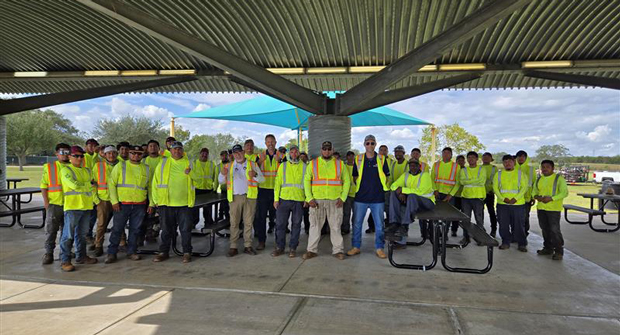John Shorb Landscaping backs its sustainable mission with diesel-electric hybrid vehicles.
Some of the latest blog entries on John Shorb Landscaping’s website focus on sustainable landscaping practices, such as beneficial insects, rooftop gardens, conservation and stormwater management. The company, based in Kensington, Md., also promotes its sustainability message on its Facebook page.
The efforts all are part of an overall commitment to resource conservation. John Shorb Landscaping has built a sizable portfolio of services that appeal to eco-conscious customers. To build on its sustainability message, the company ordered two diesel-electric hybrid box trucks in 2012 and began driving them in the spring of 2013.
“We thought this played into our image of trying to do the right thing environmentally,” says John Shorb, president of the company.
In addition to the environmental benefits, Shorb expects the trucks to provide fuel savings. As of September, the company was still evaluating how much it has cut fuel use. “We are noticing fuel savings,” Shorb says. “We don’t have empirical data proving it. It’s mainly based on the fact that we’re not fueling up as often.”
Why hybrids?
The trucks Shorb purchased were 2014 Hino 195h diesel-electric hybrid box trucks. The company drove Isuzu box vans for several years until Isuzu stopped making the model the company preferred. Shorb purchased two Hino vans and liked them enough to purchase two more. Upon visiting the Hino website to view his options, he noticed the company, a Toyota Motor Group company, offered hybrid vehicles. One of Shorb’s managers drove a Toyota Prius and spoke highly of its performance, further convincing Shorb to make the purchase.
“Hino is Toyota’s truck version (of the Prius), so we knew the brand and liked it,” Shorb recalls. “Also, we knew fuel prices weren’t going down, so we thought it would be worth a try.”
Shorb says his company plans to continue replacing its fleet with more hybrid box trucks as long as the cost remains competitive. The hybrid trucks cost about $11,000 more than a traditional diesel box truck, says Ed Ervin, a commercial fleet sales manager at K. Neal International Trucks in Hyattsville, Md.
But the hybrids are about 30 percent more fuel efficient than the standard diesel engine, says Ervin, who sold the Hino trucks to John Shorb Landscaping. The payback period on these hybrid vehicles is nearly seven years. The return on investment can fluctuate depending on the price of diesel fuel, Ervin says.
Hybrid trucks, Ervin cautions, are not suited for every industry because the trucks need to idle for the batteries to recharge. They are ideal for landscaping businesses that have many clients in the suburbs, where stoplights every few miles offer an opportunity to recharge, he says.
How it works
When the clutch engages in the hybrid system, the motor uses electric power stored in the battery to start the engine, eliminating the need for a starter motor. The hybrid system is active until the truck reaches a cruising speed, the most efficient operating mode for an engine. The truck then automatically switches to engine-only driving.
During braking, vehicle acceleration energy is converted to electricity, which is stored in battery. In this mode, the clutch automatically disengages to enable energy recovery and regeneration. Another potential fuel-saving feature is the “idle stop mode.” When the vehicle stops, the engine shuts off to reduce unnecessary fuel consumption. When the driver takes his or her foot off the brake pedal, the engine restarts.
Moving forward with hybrids
As of late July, Hino had sold about 450 195h hybrids in the U.S. since introducing them in November. Most of the sales were in California, due to the state’s Hybrid Vehicle Incentive Program.
And while adoption has been slow, more landscaping companies are showing interest in hybrid vehicles.
“I’ve quoted two or three other landscaping companies on hybrid trucks,” Ervin says. “The landscaping companies I’ve dealt with are very environmentally sensitive—a lot more than any other industry that I deal with. They’re dealing with the environment day in and day out so they seem to be more in tune with it.”
So far, Shorb says he’s pleased with the performance of the hybrid vehicles. The “idle stop mode” feature was a little frustrating at first because Shorb thought the van wasn’t working properly. “It’s a little disconcerting the first few days you’re driving it in stop-and-go traffic,” he says.
Looking ahead, though, Shorb expects the hybrid trucks will pay off.
“We hope we’re able to confirm the extra price will be offset by the fuel savings,” Shorb says. “We also believe that eventually customers will appreciate the fact that we’re doing this.

